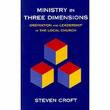
Today I am studying 'Ministry in Three Dimensions' by Steven Croft, and feel provoked to do some thinking on the following: (I'll fill in my thoughts later)
'The Church has made significant progress from seeing itself as a hierarchy, modelled upon its picture of God the Trinity as a hierarchy, to seeing itself as a community proceeding from the Holy Trinity as an open community of love.'
There is a need to be grounded in the 'theological quadrilateral: Scripture, the tradition, reason and experience.'
Even the bible itself moves from the leadership of the patriarchs (Abraham and Moses) to the leadership of all believers as the Good news spreads to the gentiles and the tribes of the whole earth, as Jesus recognises the values of the women and the childen too. Jesus trains the twelve but then calls on the 70 and on us all. We must guard against taking one text which seems to speak of how to order and organise the local church and strip it of its context or think that it is complete in its advice and therefore prescriptive. 'We are to be a radically different community in the way in which we order our life and ministry.'
'God has poured out the holy Spirit upon his people. The Spirit is not given to isolated individuals, as in the Old Testament, but on the the whole community, from the 'greatest' to the least. The narrative in Acts again continually emphasises the gift of the Spirit to those who are of lowly station and on the outside of faith as well as to those within. ''Leadership', 'Kingship' and Headship' within the Christian community belong first and foremost to Christ himself, designated within the NT, as the head of his body the Church. The Holy Spirit has given different gifts to differet members of the body of Christ, for the common good. The resulting diversity of gifts is to be celebrated and treasured, but is not to be made a cause of divison or of showing greater honour to some members of the community in preference to others. '
A concept of 'leadership' can not be derived from the OT. Do not take it from the world...'We are to be a radically different community in the way in which we order our life and ministry.' It should be 'mediated through' an understanding of 'Jesus and his mission'; 'the gift of the Holy Spirit' and 'our understanding of the church as the body of Christ'.
I find Croft's insistence on all believers, gifted through the Spirit, very encouraging. In his explanations of the make-up of service-roles, I am trying to fathom where I fit. 'Diakonia is the inheritence of every baptised Christian'. Croft explains this as service 'given within and outside the body of Christ'. I love what this calls me to be a part of and find work here exciting for it is full of variety. I need to discern whether mine is really a calling into the 'presbyteral dimension' of ministry; whether this is confirmed by God and other people - hence the reason why I start training at theological college on Wednesday but as yet, as an independent student. The other dimension being episcopal is one that I find interesting and I am pleased by the recent development at General synod but I know very little about it only that I believe in it as an idea and have respect for those who work out this dimension.
Croft argues that ordained ministry calls the priest to fulfil the mandates of all three (diaconal, presbyteral, episcopal) to the best of their ability with their colleages in Christ.
He looks at all three elements and these points I found interesting.
Deacons in scripture to look at: Phoebe, Tychicus, Epaphras. Diakonos - 'one who waits and serves at table - secular Greek, literally 'one who comes through the dust'.
'Prebus' - old - elder
A concept of 'leadership' can not be derived from the OT. Do not take it from the world...'We are to be a radically different community in the way in which we order our life and ministry.' It should be 'mediated through' an understanding of 'Jesus and his mission'; 'the gift of the Holy Spirit' and 'our understanding of the church as the body of Christ'.
I find Croft's insistence on all believers, gifted through the Spirit, very encouraging. In his explanations of the make-up of service-roles, I am trying to fathom where I fit. 'Diakonia is the inheritence of every baptised Christian'. Croft explains this as service 'given within and outside the body of Christ'. I love what this calls me to be a part of and find work here exciting for it is full of variety. I need to discern whether mine is really a calling into the 'presbyteral dimension' of ministry; whether this is confirmed by God and other people - hence the reason why I start training at theological college on Wednesday but as yet, as an independent student. The other dimension being episcopal is one that I find interesting and I am pleased by the recent development at General synod but I know very little about it only that I believe in it as an idea and have respect for those who work out this dimension.
Croft argues that ordained ministry calls the priest to fulfil the mandates of all three (diaconal, presbyteral, episcopal) to the best of their ability with their colleages in Christ.
He looks at all three elements and these points I found interesting.
Deacons in scripture to look at: Phoebe, Tychicus, Epaphras. Diakonos - 'one who waits and serves at table - secular Greek, literally 'one who comes through the dust'.
'Prebus' - old - elder



No comments:
Post a Comment